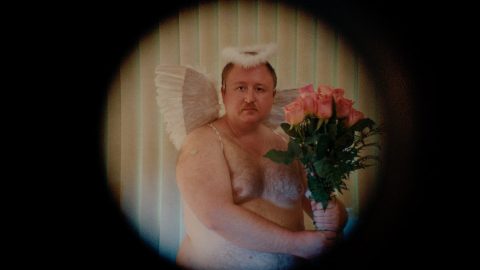For many people, in a world defined by attractiveness, to be fat is to feel invisible. To move through spaces and places without impact. To fade into the margins. To be alone.
Harvey (Benjamin Turnbull) is a fat man, with chubby cheeks, a rotund figure and a protruding belly. His days are routine and samey. Waking up, travelling to work in a lab, returning home. Visiting his dying father in the hospital. But within that uneventful existence is an intense longing. A longing to be seen. To break out of monotony. To feel loved.
For invisibility is not so much a reality of fatness but an internal state of mind, perpetuated by a lack of self-confidence and the negativity of conventional representation; once seen, once loved, once appreciated, a fat body can be an immense source of strength. Devin Shears’ tender debut Cherub (2024) understands all this and more, using the simplicity of its storytelling to unfurl its precise message of love and acceptance, both inside and out.
The film, set in 2000, stresses his isolation through its (almost) complete absence of dialogue, using a 4:3 ratio to centre Harvey in nearly every frame. Turnbull plays him as a gentle observer of the world around him — the pretty girl who has lunch at the same time as him; other people making out in a botanical garden; other commuters on the bus — as opposed to an active force in his own story. This is further stressed by the percussive strings on the soundtrack, enveloping Harvey in a delicate world with a tinge of unreality.
On a trip to a porno store, the straight man leafs through a gay magazine named Cherub, for “big men and their admirers.” On its paper pages, full-frontal fat men lie in various poses, staring directly at the camera, unafraid of who they are. Turnbull plays this discovery with a mixture of excitement and shame, essentially stealing the magazine before later devouring its pages at home. Of particular note is Cherub of the Month, with a Chicago postal address listed at the bottom. Tempted to break out of a life defined by loneliness, Harvey sends in his self-portrait… setting him off on a touching journey of self-empowerment.
This is basically all there is to the slight 73-minute Cherub, which was made for $10,000 but still looks better than many movies made for hundreds of times the budget. Featuring textured frames, deliberate blocking and a joyful sense of colour and light, this is a visually alive work of art that, while occasionally dipping into saccharine territory or lingering too long on certain moments, powerfully immerses us into Harvey’s specific reality — giving voice to the types of people rarely given their own cinematic portrayals. A small movie with a huge empathetic core.
Redmond is the editor-in-chief of Journey Into Cinema.





